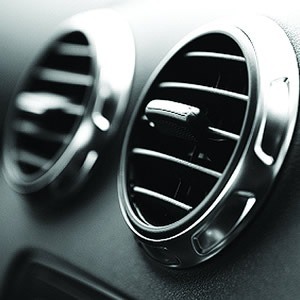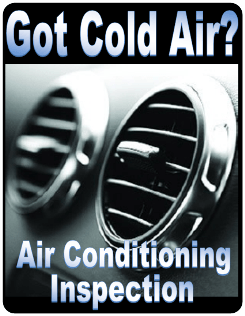
Heating and Air Conditioning Tests
- Pressure test engine cooling system
- A/C system pressures are measured and compared to manufacturer's specifications
- A/C system is leak tested
- Both the heater and A/C are performance tested by checking the outlet air temperature at the discharge vents

Air Conditioning Service

Auto A/C & Heating Services
If the breeze from those open windows just isn't cutting it, come by our shop in Bellevue, NE 68005 to get an expert opinion on what we can do to fix your auto A/C or heating problems. We offer affordable prices and guaranteed workmanship. Contact us so we can help you drive in comfort
Why maintaining your AC System is very important:
Heating and A/C systems may break eventually with usage, hose pipes may clog and drip if not serviced, causing reduced efficiency heating and cooling capabilities. Regular maintenance will keep your AC system operating at peak performance!
Indications your A/C system may be having issues:
- If your air conditioning blows only slightly cooler air compared to the exterior air
- Air that blows in smells damp, musty, or like mildew and mold
- Your cabin does not warm up in cold weather, or is just a little warmer than outside
- The defroster takes longer than typical to operate, or does not operate
- Your heater or A/C only functions when driving, not when idling, or quits blowing when the car is stationary
- Your heating system blows cold air, or the air conditioning blows warm air
- Low airflow even at the highest fan setting.
A comprehensive evaluation of heating and A/C system includes:
- Examining the internal controls and blower
- Checking radiator coolant operating temperature, hoses, pressure radiator cap and thermostat
- Inspecting the compressor belt
- Inspecting system and seals for leaks or various other damages.
- A cooling system pressure test
- Verifying the A/C pressure meets manufacturer specifications
- Measuring the interior vent air temperature
Your car's engine is the power source for both heating and air conditioning systems. The systems also share other components, as the diagram shows. Here's what happens when you flip on the heat or the air conditioner:
Heating System
Heat is a byproduct of the engine's combustion process. The coolant in your car’s radiator absorbs the heat. The coolant is then circulated through the heater core before returning to the radiator. The heating system also includes a series of air ducts, a blower motor and fan, and temperature and duct controls, which select the desired temperature and direct the flow of warm air.

Air Conditioning System
This system shares air ducts, controls and a blower with the heater, but has its own refrigerant system. The air conditioning system is comprised of the following components:
- 1. Compressor
This is a pump that pressurizes and circulates the refrigerant through the system. - 2. Condenser
As the refrigerant flows through the condenser, it gives off heat and converts from gas to liquid. - 3. Receiver/Dryer or Accumulator
This is where clean, dry refrigerant is stored as it circulates through the system. - 4. Orifice Tube or Expansion Valve
This is a metering device that controls the flow of refrigerant through the system. - 5. Evaporator Core
Refrigerant enters the evaporator core as a liquid. Heat from the air converts the liquid refrigerant back into a gas, which cools the air before it enters your vehicle.
Air Conditioning Service & Repair:
Let’s talk about air conditioning service and repair issues for the Council Bluffs NE area. Most of us in Bellevue we don’t give our air conditioning a second thought as long as it’s making cold air. But it’s a complex and expensive system that we should think about before it starts blowing hot air.
The refrigerant in the air conditioner contains a special oil that lubricates and cools the A/C parts. This oil is eventually used up. Your air conditioner still makes cold air, but the parts don’t have oil to protect them and they wear out faster than they should so it’s important to service the air conditioner as recommended by your Bellevue NE service center.
Replacing old refrigerant has another benefit: refrigerant tends to gather moisture and become corrosive. That causes leaks in the system which can be expensive to repair. Fresh refrigerant protects the air conditioning components and keeps the system operating at peak efficiency so it doesn’t have to work as hard to keep you cool.
Even with regular service A/C parts can just wear out. Normal wear and tear eventually gets to all moving parts.
Addressing early problems can save on more extensive repairs down the road. For instance, a common failure is the clutch that turns the compressor on and off. If you can take care of a bad A/C clutch when it first starts having problems, you may be able to save the compressor. Wait too long and you’ll have to replace both.
Check your owner’s manual or ask your Bellevue service advisor at Yeck’s Tire & Auto Repair for service recommendations. And if you’re hearing strange sounds when your air conditioning turns on, or if it just isn’t as cold as it used to be, have us give it the once over see what it’ll take to keep you cool.

More Information on Air Conditioning Service by NAPA Service Assistant:
Air Conditioning Maintenance At Yeck's Tire & Auto In Bellevue NE

Most Bellevue area car owners don't service their air conditioning until after it fails. Maintaining your vehicle air conditioning system means that you always have enough refrigerant to properly do the job. Small leaks in the air conditioning system allow the refrigerant to escape and the system can't cool the air as well.
Along with the refrigerant, a special oil circulates in the system. The oil lubricates air conditioning components, and keeps the seals resilient. Low refrigerant and lubricating oil means that the air conditioning parts will wear out prematurely, and we all know that air conditioning repairs can be costly in Omaha.
Air conditioning service at Yeck's Tire & Auto in Bellevue starts with a visual inspection of the components for signs of damage or leaks. The compressor is driven by a belt from the engine, most often the serpentine belt, so it's inspected for cracks or wear.
The air conditioning compressor and other components are checked for proper operation by your Yeck's Tire & Auto service advisor. Then comes the leak test. If a leak is detected, often in a hose or connection, it's repaired and the vehicle system is retested. Your Yeck's Tire & Auto technician will also perform a temperature drop test.
If needed, the old refrigerant is evacuated and the system is recharged with clean, fresh refrigerant. A final test insures that the air conditioner is working, and you're on your way.
How often this should be done at Yeck's Tire & Auto varies from vehicle to vehicle. Your vehicle owner's manual will have the manufacturer's recommendation and, of course, your friendly and knowledgeable Yeck's Tire & Auto service advisor can tell you. It's typically every two years.